This article needs additional citations for verification .(October 2020) |

(date and artist unknown)
Hans Heinrich Eduard Vieweg (15 July 1797, Berlin - 1 December 1869, Braunschweig) was a German publisher; the owner of Vieweg Verlag.
This article needs additional citations for verification .(October 2020) |

Hans Heinrich Eduard Vieweg (15 July 1797, Berlin - 1 December 1869, Braunschweig) was a German publisher; the owner of Vieweg Verlag.
He was born to the publisher and bookseller, Friedrich Vieweg. When his family moved to Braunschweig, in 1799, he came under the influence of his grandfather, the educator and publisher, Joachim Heinrich Campe. He attended grammar school there, but joined the Hussar regiment in 1813, and was promoted to Sergeant the following year. After participating in several campaigns, he was placed on leave with a foot ailment, possibly caused by poor riding habits, and was discharged in 1815.
After some initial training at his father's company, from 1821 to 1823 he worked for Hoffmann und Campe, operated by his uncle, Julius Campe in Hamburg. After that, he visited England and France where, in Paris, he befriended the chemist, and his future business partner, Justus von Liebig. In 1825, he married a distant cousin, Luise Campe; daughter of the Leipzig financier, Heinrich Wilhelm Campe (1771-1862).
That same year, he became a partner in his father's publishing house, bringing in the latest presses and equipment, which he had discovered while traveling. [1] He also made and patented several improvements. With his brother Karl, a farmer, he founded his own paper company. Most of the works he chose to publish were of a scientific nature. He became the owner of the firm when his father died in 1835.
Politically, he was a moderate Liberal; supporting the idea of a unified Germany, under the leadership of Prussia. To this end, from 1831, he published a newspaper, the Deutsche Nationalzeitung aus Braunschweig und Hannover, edited by Karl Heinrich Hermes . It was issued until 1840, when the increasing censorship forced him to discontinue it. In 1848, he made another attempt with a similar newspaper, the Deutsche Reichs-Zeitung , edited by Karl Andree. This lasted until 1866, when Prussia annexed Schleswig-Holstein after the Seven Weeks' War, and Vieweg found his support for Prussia waning.
He was also involved in local politics; serving on the city council (1839–1855) and in the Landtag (1848–1867). In 1852, he participated in creating the Braunschweigische Bank , and served on its board of directors until 1861.
In October 1866, he suffered a stroke and remained bedridden until his death in 1869. Vieweg Verlag passed to his only son, Heinrich Vieweg .

Braunschweig or Brunswick is a city in Lower Saxony, Germany, north of the Harz Mountains at the farthest navigable point of the river Oker, which connects it to the North Sea via the rivers Aller and Weser. In 2016, it had a population of 250,704.

The Duchy of Brunswick was a historical German state. Its capital was the city of Brunswick . It was established as the successor state of the Principality of Brunswick-Wolfenbüttel by the Congress of Vienna in 1815. In the course of the 19th-century history of Germany, the duchy was part of the German Confederation, the North German Confederation and from 1871 the German Empire. It was disestablished after the end of World War I, its territory incorporated into the Weimar Republic as the Free State of Brunswick.

Joachim Heinrich Campe was a German writer, linguist, educator and publisher. He was a major representative of philanthropinism and the German Enlightenment.
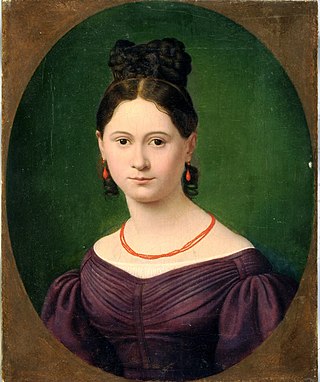
Johanna Bertha Julie Jenny Edle von Westphalen was a German theatre critic and political activist. She married the philosopher and political economist Karl Marx in 1843.

Rudolf Wilke was a German caricaturist and illustrator; best known for his work at the satirical magazine, Simplicissimus.

Felix (von) Lichnowsky, fullyFelix Maria Vincenz Andreas Fürst von Lichnowsky, Graf von Werdenberg was a son of the historian Eduard Lichnowsky who had written a history of the Habsburg family.

Friedrich Georg Weitsch was a German painter and etcher.
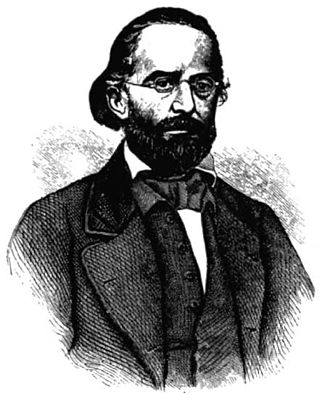
Henry Boernstein [in Europe, Heinrich Börnstein] was a German revolutionary who served as the publisher of the Anzeiger des Westens in St. Louis, Missouri, the oldest German newspaper west of the Mississippi River. He was also a political activist, author, soldier, actor and stage manager, and was briefly yet closely acquainted with Karl Marx during his tenure as publisher of the radical newspaper Vorwärts. He played a major role in keeping Missouri in the Union at the start of the Civil War.

Braunschweigisches Landesmuseum (BLM) is a history museum in Braunschweig, Germany, operated by the state of Lower Saxony. The museum is scattered on four locations: Vieweghaus, Hinter Ägidien, Kanzlei (Wolfenbüttel) and Bauernhausmuseum (Bortfeld).

Johann Friedrich Vieweg was a German publisher and the founder of Vieweg Verlag.
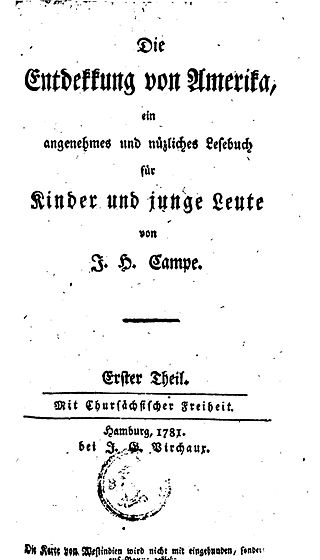
The Discovery of America is a trilogy written by the German author and educator Joachim Heinrich Campe (1746–1818). It was originally published in 1781/82 as Die Entdekkung von Amerika – ein angenehmes und nützliches Lesebuch für Kinder und junge Leute and deals with the discovery, early exploration and conquest of America by focusing on one explorer in each volume: Christopher Columbus is treated first, followed by Hernán Cortés and finally Francisco Pizarro. The work is counted among the first books of specific children's literature, directly targeting children and adolescents as its main audience, and Campe is said to have "set the standard for German children's literature." The trilogy is defined by its author's involvement in the German educational movement of philanthropinism and has been a great success, also being translated into several languages.
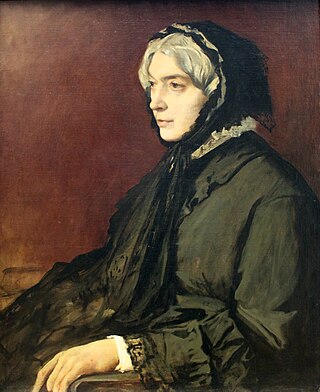
Henriette Feuerbach was a German author and arts patron. She was the wife of Joseph Anselm Feuerbach and the stepmother of painter Anselm Feuerbach, whom she supported in his art.
Landmeister of Prussia was a high office in the Teutonic Order. The Landmeister administered the land of Prussia of the Teutonic Order. It was in existence as a separate office from 1230 to 1309, later being held in union with the office of Grand Master until 1525.
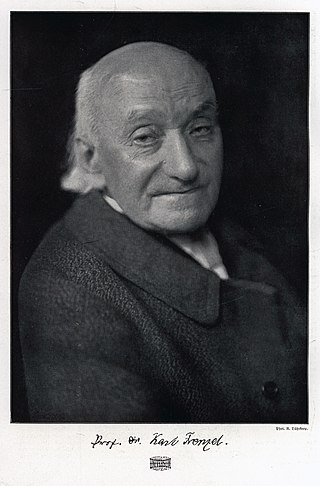
Karl Wilhelm Theodor Frenzel was a German novelist, essayist and theatre critic.
Karl Friedrich Wilhelm Wander was a German pedagogue and Germanist. He published the largest existing collection of German-language proverbs.

Auguste Sophie Crelinger (widowed Stich, born Düring was a German stage actress.

Eduard Adolf Daelen was a German painter and writer. For some of his writings he used the pseudonyms Ursus teutonicus, Angelo Dämon, Edu Daelen-Bachem and Michel Bär. He became known above all for the first biography of Wilhelm Busch, which he wrote in 1886.

Max Ring was a German physician, novelist, poet, and dramatist.
Ernst Strehlke was a German historian and archivist. He dedicated his rather short life to the history of the Teutonic Order.
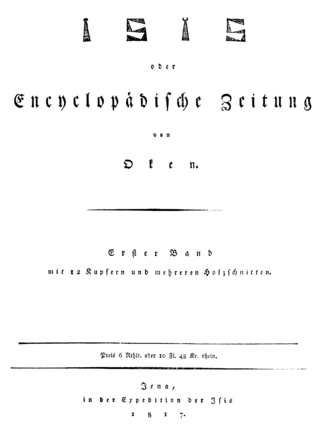
Isis was an encyclopedic journal that focused on articles on natural science, medicine, technology, economics as well as art and history. It also published important articles on science policy and the organization of science. Edited by Lorenz Oken and published by Friedrich Arnold Brockhaus, Isis was the first interdisciplinary journal in the German-speaking world.